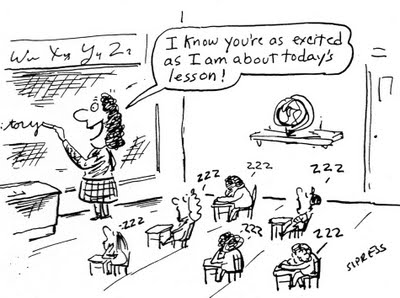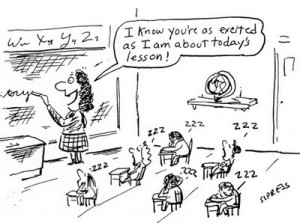Part 2 of our lecturers’ letter of advice to their students …
Dear students,
We really enjoy teaching you but there are some things we wish you knew…
6. We don’t want you to fail your exams
Every year people come out of the exams complaining (or sometimes weeping!) about how they’ve definitely failed and the lecturer was clearly being mean on purpose so everyone would fail. This upsets us because it shows that you don’t trust us to be decent human beings and/or professional educators. Generally speaking, everyone does fine on the exams we set. If, for some reason (and its rare) everyone does obviously badly on an exam then it may be the case that something was misunderstood or an inappropriate question was set. When this happens we usually re-mark the exam or change the marking scheme appropriately to make it fair, and so that the number of people who pass is in line with the other exams.
7. Getting 59% overall for the year doesn’t mean you were 1 mark away from a 2.i
Your final year mark is made up of all the coursework you’ve done, plus your exams, and comes out of a total of about 1000 marks. So 1% is not equal to 1 mark. For example, if 50% of your course was continuous assessment and you got 60%, you still need 60% in your exams to get 60% overall. Often a single percent overall means finding 10% more from an exam, the equivalent of changing your grade for an essay from a 2.i to a 1st. Sometimes it is possible to find an extra mark or two but 10% suggests that the person marking the exam made a serious error, which is very unlikely. At Trinity College Dublin everything in the final year is marked, then checked by at least two other people, one of which is an external examiner who keeps standards level with those across Europe. The project is independently marked by at least two people, as well as being checked by the examiner.
8. Collective success might be more akin to collective mediocrity
Studying as part of a group can be a fun way to revise for exams, and provide a challenging environment where you can bounce ideas off each other and learn. However, there is a potential downside. Exam study groups can often produce generic essays that have been carefully prepared by the collective. In the worst case scenario, this can drag everyone towards the mean. Furthermore, unoriginal and repetitive answers can bore the pants out of the person marking them.
9. Question spotting is a terrible idea
People have somehow got the idea that they can get away with only studying one or two topics before an exam because the same topics come up year after year. Whilst this is true, precisely the same questions do NOT appear each year, and at some point we may stop using any given topic. This question-spotting leads to people learning the “answer” to a previous year’s question and trying to apply it to the paper in front of them. Not answering the question before you in the exam, but instead regurgitating and shoe-horning in a prepared answer will not gain you marks. By all means be strategic in your revision but make sure you cover the whole course, but even more importantly, make sure you answer the questions you are given. Never rely on topics remaining the same from year to year – course content changes, as do lecturers, so you may find yourself in a situation where none of your topics come up if you only revise some of them. If that happens it’s no-one’s fault but your own!
10. Education is a privilege. Enjoy it!
Believe it or not, we hate exams as much as you do! However, we need to assess students somehow; we can’t just give everyone a degree. If we did, what would be the point in studying? Because of this, exams remain part of being a student. Notice that we say “a part” of being a student. As a student you should be here to learn as much as you possibly can from some of the leading academics in your subject. You should not be trying to learn as little as possible so you can pass an exam. Yet the question we get asked the most is “what do I need to know for the exam?”. This is infuriating because it implies that only knowledge needed to pass the exam is valuable, when learning for the sake of learning is one of the most wonderful experiences in life. In addition, many of the things you’ll learn as a student, like presentation skills, teamwork, communication skills, time management etc. are not worth any marks in exams. But these are the skills employers are looking for. Don’t waste the opportunity to improve your career prospects and general knowledge of science just because it doesn’t count towards your final grade. Education is about so much more than that.
Yours sincerely,
Natalie Cooper & Andrew Jackson (Assistant Professors at TCD)
@nhcooper123 @yodacomplex
ncooper[at]tcd.ie, a.jackson[at]tcd.ie
Image source:
readingforall101.blogspot.ie


